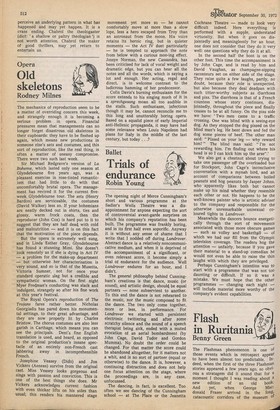Old skeletons
Rodney Milnes
The mechanics of reproduction seem to be a matter of overriding concern this week, and strangely enough it is becoming a serious problem in opera. Financial pressures mean that managements can no longer forget disastrous old skeletons in their cupboards: they have to be fleshed up again, which means new productions in someone else's sets and costumes, and, this sort of reproduction, like the real thing, is often a matter of uneasy compromise. There were two such last week.
Sir Michael Redgrave's version of La Boheme, which lasted only one season at Glyndebourne five years ago, was a pleasant exercise in rose-tinted romanticism that had little to do with that uncomfortably brutal opera. Themanagement has revived it for the current fiveweek Glyndebourne tour. The sets (Henry Bardon) are serviceable, the costumes (David Walker) less so. If your bohemians are neatly decked out in shirts, ties and glossy, warm frock coats, then the reproducer (John Cox) is hard put to it to suggest that they are half dead with cold and malnutrition — and it is on this fact that the motivation of the piece depends.
But the opera is extremely well sung, and in Linda Esther Gray, Glyndebourne has found a stunning Mimi. She doesn't look remotely as if she is dying in Act IV — a problem for the make-up department — but otherwise her characterisation is very sound, and so is that of the Musetta, Victoria Sumner, not for once your standard operatic slag but a credible and sympathetic woman. On the first night Myer Fredman's conducting was slack and indulgent, strangely so after his fine work at this year's festival.
The Royal Opera's reproduction of The Trojans fares rather better. Nicholas Georgiadis has pared down his monumental settings, to their great advantage, and they are now properly lit by Charles Bristow. The chorus costumes are also less garish in Carthage, which means you can see the principals. Dent's fine English translation is used, and heard, as opposed to the original production's insane spectacle of an entirely non-French cast jabbering away in incomprehensible French.
Josephine Veasey (Dido) and Jon Vickers (Aeneas) survive from the original cast. Miss Veasey looks gorgeous and sings with passion and conviction. This is one of the best things she does. Mr Vickers acknowledges current fashion with even thicker lifts on his soles than usual; this renders his mannered stage movement yet more so — he cannot comfortably move at more than a slow lope, less a hero escaped from Troy than an astronaut from the moon. His voice retains its heroic ring, but in quieter moments — the Act IV duet particularly — he is tempted to approach the note from below with a curious moo-ing effect. Jessye Norman, the new Cassandra, has been criticised for lack of vocal weight and dramatic edge, but you can hear all the notes and all the words, which is saying a lot and enough. Her acting, regal and direct, is in welcome contrast to the ludicrous hamming of her predecessor.
Colin Davis's burning enthusiasm for the score extends to his singing much of it in a sprechgesang moan all too audible in the stalls. Such enthusiasm, infectious though it may be, cannot reconcile me to this long and unutterably boring opera. Based on a squalid piece of early Imperial anti-Hellenic propaganda, it may have had some relevance when Louis Napoleon had plans for Italy in the middle of the last century, but today. . .?










































 Previous page
Previous page